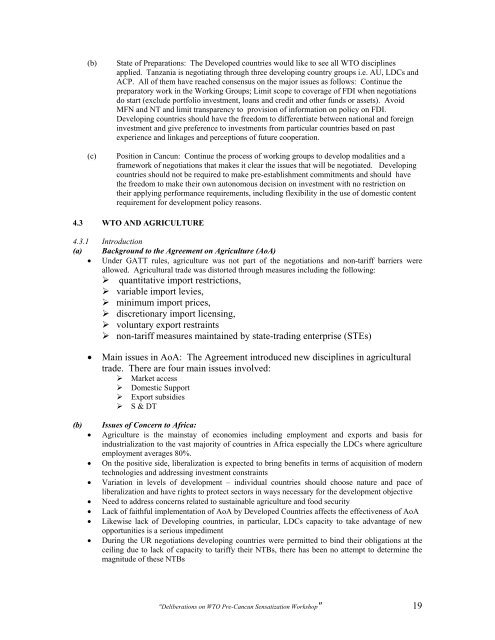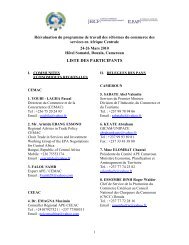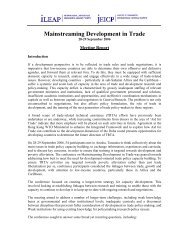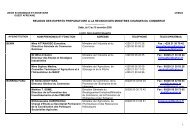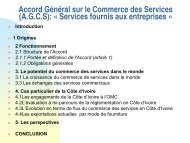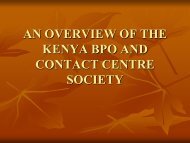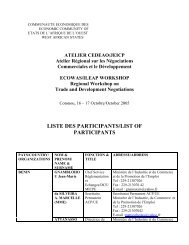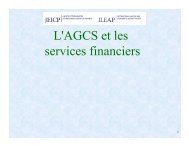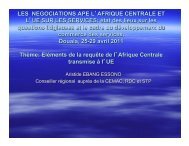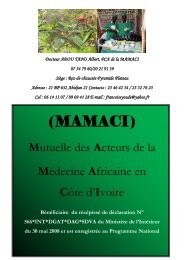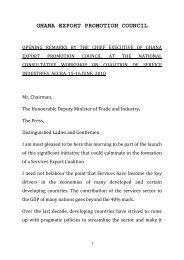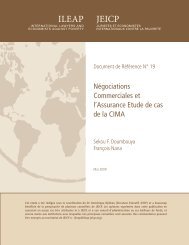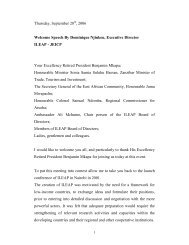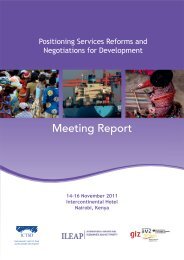Tanzania Report, Dar-Es-Salaam, Tanzania - ILEAP
Tanzania Report, Dar-Es-Salaam, Tanzania - ILEAP
Tanzania Report, Dar-Es-Salaam, Tanzania - ILEAP
You also want an ePaper? Increase the reach of your titles
YUMPU automatically turns print PDFs into web optimized ePapers that Google loves.
(b)(c)State of Preparations: The Developed countries would like to see all WTO disciplinesapplied. <strong>Tanzania</strong> is negotiating through three developing country groups i.e. AU, LDCs andACP. All of them have reached consensus on the major issues as follows: Continue thepreparatory work in the Working Groups; Limit scope to coverage of FDI when negotiationsdo start (exclude portfolio investment, loans and credit and other funds or assets). AvoidMFN and NT and limit transparency to provision of information on policy on FDI.Developing countries should have the freedom to differentiate between national and foreigninvestment and give preference to investments from particular countries based on pastexperience and linkages and perceptions of future cooperation.Position in Cancun: Continue the process of working groups to develop modalities and aframework of negotiations that makes it clear the issues that will be negotiated. Developingcountries should not be required to make pre-establishment commitments and should havethe freedom to make their own autonomous decision on investment with no restriction ontheir applying performance requirements, including flexibility in the use of domestic contentrequirement for development policy reasons.4.3 WTO AND AGRICULTURE4.3.1 Introduction(a) Background to the Agreement on Agriculture (AoA)• Under GATT rules, agriculture was not part of the negotiations and non-tariff barriers wereallowed. Agricultural trade was distorted through measures including the following:‣ quantitative import restrictions,‣ variable import levies,‣ minimum import prices,‣ discretionary import licensing,‣ voluntary export restraints‣ non-tariff measures maintained by state-trading enterprise (ST<strong>Es</strong>)• Main issues in AoA: The Agreement introduced new disciplines in agriculturaltrade. There are four main issues involved:‣ Market access‣ Domestic Support‣ Export subsidies‣ S & DT(b)Issues of Concern to Africa:• Agriculture is the mainstay of economies including employment and exports and basis forindustrialization to the vast majority of countries in Africa especially the LDCs where agricultureemployment averages 80%.• On the positive side, liberalization is expected to bring benefits in terms of acquisition of moderntechnologies and addressing investment constraints• Variation in levels of development – individual countries should choose nature and pace ofliberalization and have rights to protect sectors in ways necessary for the development objective• Need to address concerns related to sustainable agriculture and food security• Lack of faithful implementation of AoA by Developed Countries affects the effectiveness of AoA• Likewise lack of Developing countries, in particular, LDCs capacity to take advantage of newopportunities is a serious impediment• During the UR negotiations developing countries were permitted to bind their obligations at theceiling due to lack of capacity to tariffy their NTBs, there has been no attempt to determine themagnitude of these NTBs"Deliberations on WTO Pre-Cancun Sensatization Workshop" 19


